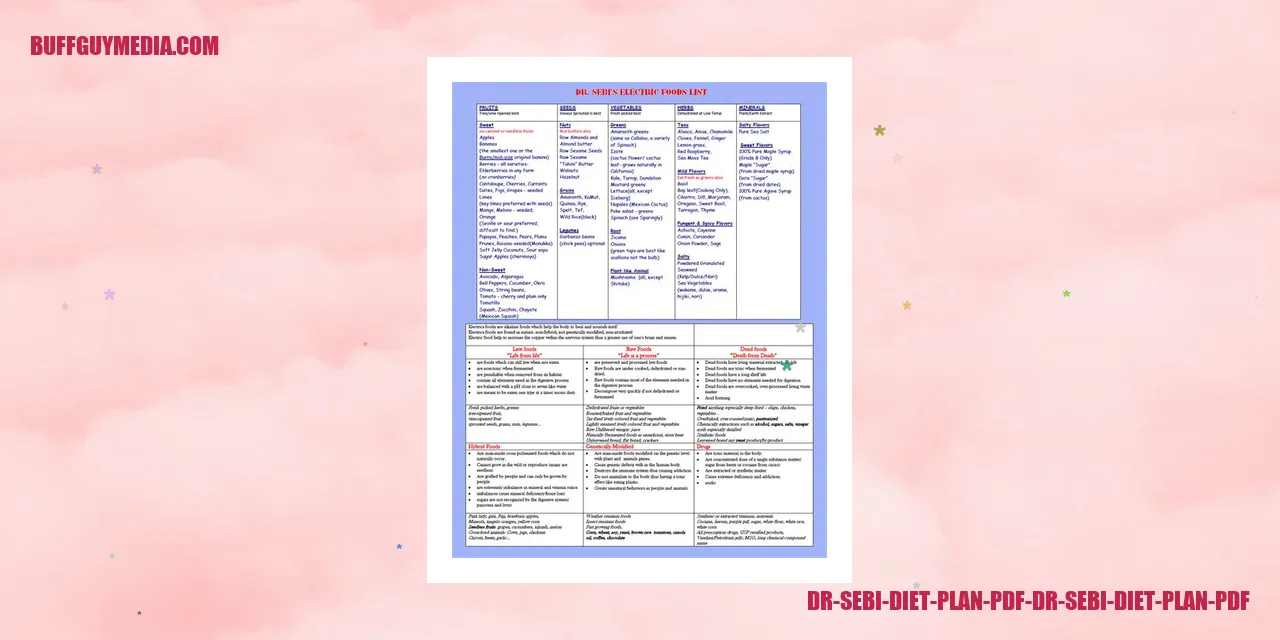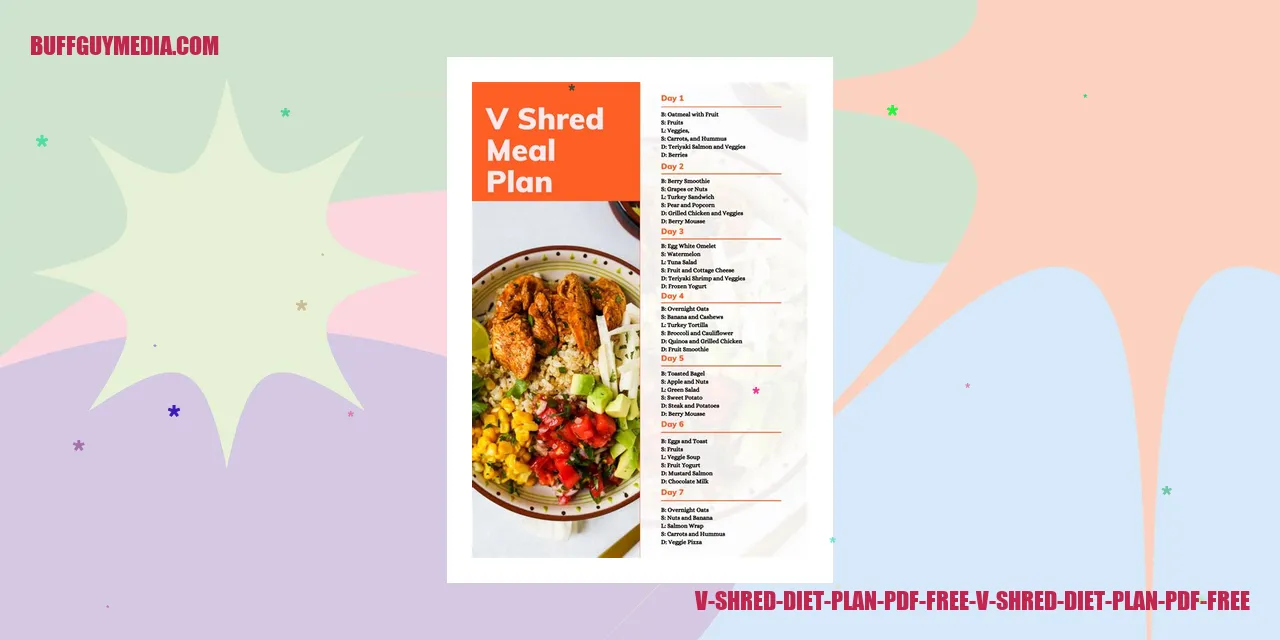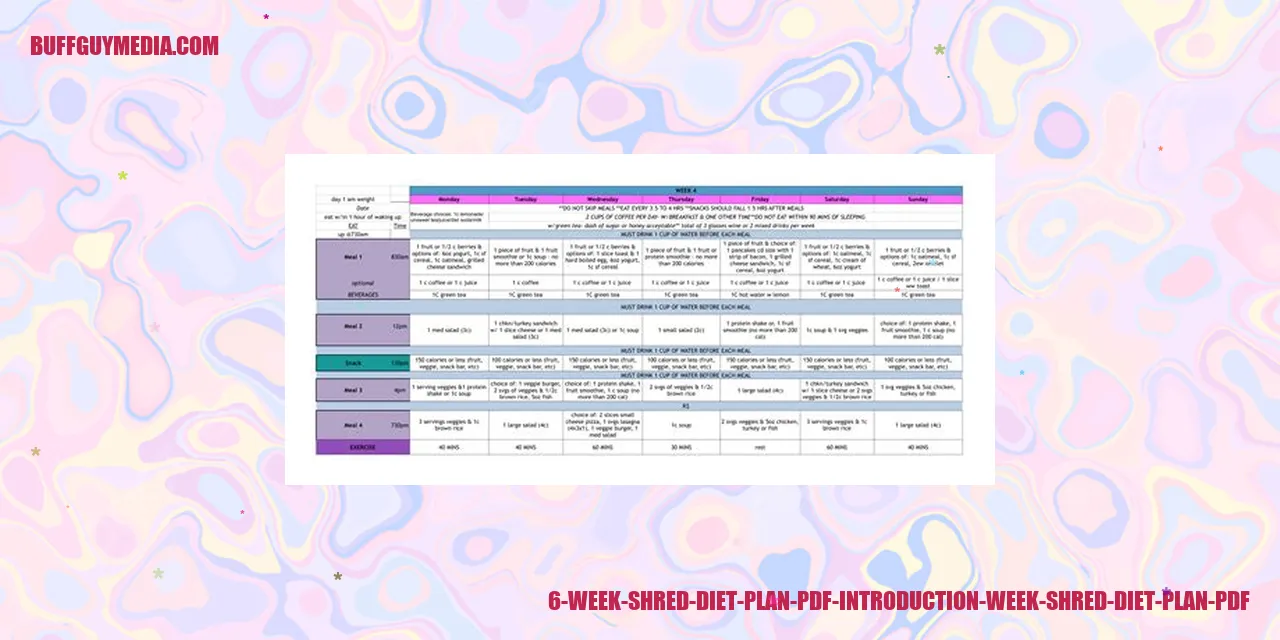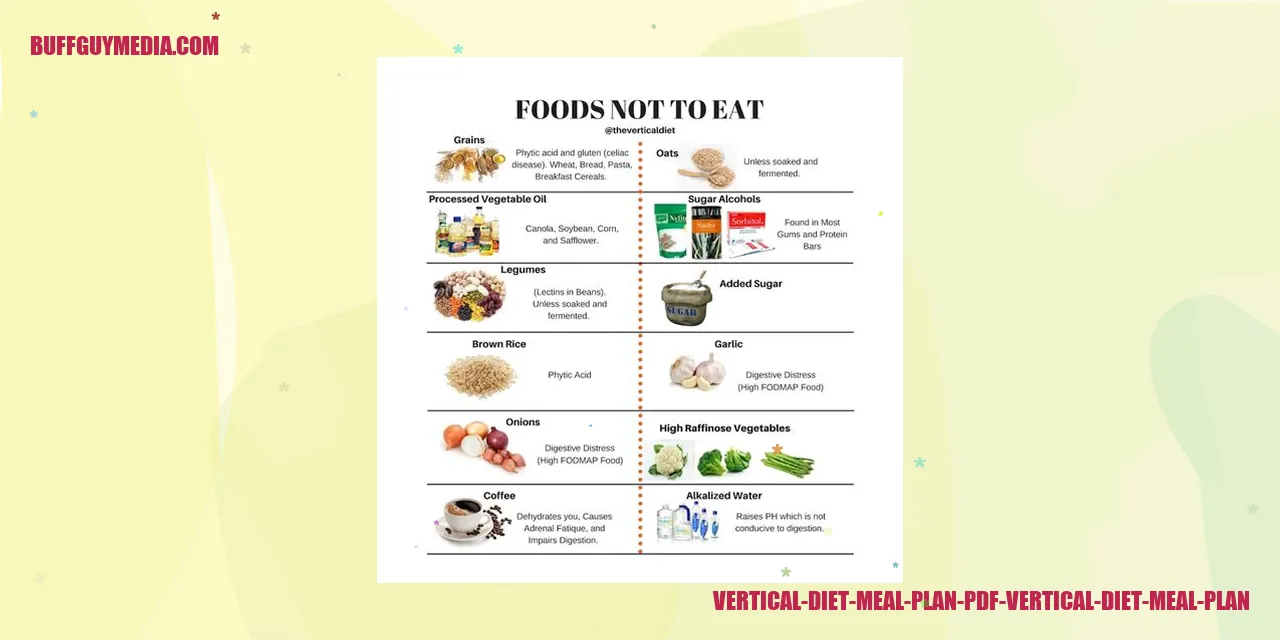Vegetarian Keto Diet Plan Free PDF: A Comprehensive Guide for a Healthy Lifestyle
The Comprehensive Guide to a Vegetarian Keto Diet
Understanding the Basics of a Vegetarian Keto Diet
Embarking on a Vegetarian Keto Diet involves adopting a unique and structured approach to your eating habits. This increasingly popular low-carbohydrate diet combines the principles of a vegetarian lifestyle with the benefits of a ketogenic diet. By reducing your carbohydrate intake, you can prompt your body to enter a metabolic state called ketosis, which can lead to substantial health improvements.
Discovering the Benefits of a Vegetarian Keto Diet
A Vegetarian Keto Diet offers a range of potential advantages for those seeking to enhance their overall well-being. This dietary plan may facilitate weight loss by encouraging the utilization of stored fat as an energy source. Additionally, it can enhance insulin sensitivity, reduce inflammation, and lower the risk of chronic conditions such as heart disease and type 2 diabetes.
The Key Principles of a Successful Vegetarian Keto Diet
To effectively follow a Vegetarian Keto Diet and reap its benefits, it is essential to adhere to key principles. Focus on incorporating plant-based protein sources like tofu, tempeh, and legumes, as well as healthy fats such as avocados, nuts, and seeds. Complement these with non-starchy vegetables and modest portions of low-carb fruits, while avoiding high-carbohydrate foods like grains, starchy vegetables, and sugary treats.
A Sample meal plan for a Vegetarian Keto Diet
If you’re looking for inspiration on how to structure your meals, here’s a sample Vegetarian Keto Meal Plan:
Breakfast: Start your day with a nourishing dish of scrambled tofu paired with nutrient-rich spinach and creamy avocado.
Lunch: Savor a deliciously guilt-free cauliflower crust pizza topped with a medley of fresh vegetables, melted cheese, and a drizzle of fragrant olive oil.
Snack: Boost your energy levels in between meals with a satisfying handful of mixed nuts and seeds for a crunchy and healthy treat.
Dinner: Relish a flavorsome bowl of zucchini noodles coated in a creamy Alfredo sauce, offering a low-carb alternative to traditional pasta dishes.
Snack: Indulge your taste buds with a delightful coconut chia pudding, accompanied by a burst of naturally sweet berries for a refreshing dessert option.
It is crucial to consult with a healthcare professional or a registered dietitian before commencing any new diet, particularly if you have existing medical conditions.
[[READMORE]]
In conclusion, embarking on a Vegetarian Keto Diet can provide numerous health benefits by flawlessly integrating the principles of a vegetarian lifestyle with the restrictions of a low-carb ketogenic approach. Always remember to adhere to the key principles of the diet and consult with a healthcare professional to ensure a safe and successful adaptation to this dietary plan.
html
Exploring the Vegetarian Keto Diet for Effective Weight Loss
Also read:
Chuck Todd Weight Loss: The Journey to a Healthier Lifestyle
Alyssa’s Healthy Vegan Bites Copycat Recipe: Discover the Deliciousness!

The Benefits of Incorporating a Vegetarian Keto Diet for Weight Loss
The Vegetarian Keto Diet is gaining traction among individuals seeking a successful weight loss method. By combining the principles of the ketogenic diet with a plant-based approach, this low-carb, high-fat eating plan offers significant benefits.
The high-fat content of the vegetarian keto diet helps to trigger ketosis, a state in which the body relies on fat for energy instead of carbohydrates. By reducing carb intake, the body starts utilizing stored fat, ultimately leading to weight loss.
Tips to Achieve Effective Weight Loss on a Vegetarian Keto Diet
To optimize weight loss on the vegetarian keto diet, consider implementing the following tips:
- Opt for healthy fats: Integrate sources of healthy fats like avocados, nuts, seeds, and olive oil into your meals. Not only do these fats induce satiety, but they also provide essential nutrients.
- Incorporate protein-rich foods: Ensure an adequate intake of protein by incorporating tofu, tempeh, eggs, and dairy alternatives into your diet. Protein contributes to maintaining muscle mass and facilitates weight loss.
- Limit processed foods: Steer clear of processed and packaged vegetarian keto-friendly products, as they often contain artificial additives and unhealthy fats. Instead, opt for whole, unprocessed foods.
- Stay hydrated: Hydration is crucial for proper digestion and can help curb cravings and prevent overeating. Aim to drink ample water throughout the day.
- Meal planning preparation: Plan your meals in advance to ensure a ready supply of nutritious options. This proactive approach can prevent impulsive food choices and keep you aligned with your weight loss goals.
Top Foods for Weight Loss on a Vegetarian Keto Diet
While following a vegetarian keto diet, consider incorporating the following foods for effective weight loss:
- Low-carb vegetables: Include leafy greens, broccoli, cauliflower, zucchini, and bell peppers, which are low in carbs and packed with essential vitamins and minerals.
- Healthy fat sources: Avocado, nuts, seeds, coconut oil, and olive oil are excellent choices when it comes to incorporating healthy fats into your vegetarian keto diet.
- Plant-based proteins: Tofu, tempeh, edamame, and seitan are great options for meeting your protein requirements while adhering to a vegetarian keto diet.
- Dairy alternatives: Unsweetened almond milk, coconut milk, and soy milk are viable options for those following a vegetarian keto diet seeking variety in their beverage choices.
- Low-sugar fruits: Berries like strawberries, raspberries, and blackberries are low in carbs and can be enjoyed in moderation while aiming for weight loss on the vegetarian keto diet.
Common Mistakes to Avoid on the Vegetarian Keto Diet
When embarking on a vegetarian keto diet for weight loss, it is crucial to be mindful of common mistakes that can hinder progress:
- Overlooking total calorie intake: Although the vegetarian keto diet promotes weight loss, ensuring a calorie deficit is still essential. Keep track of portion sizes and overall calorie consumption to avoid overeating.
- Insufficient vegetable intake: Vegetables offer vital nutrients and fiber intake on any diet. Make sure to incorporate a variety of low-carb vegetables to meet your requirements for fiber and nutrients.
- Excessive consumption of unhealthy fats: While healthy fats are essential, it is crucial to focus on quality sources and avoid excessive consumption of unhealthy fats found in fried foods and processed snacks.
- Neglecting protein sources: Protein is fundamental for muscle preservation and overall well-being. Ensure adequate intake of vegetarian protein sources in your meals.
- Failure to track macronutrient ratios: Staying in ketosis requires maintaining the appropriate balance of carbohydrates, fats, and proteins. Keep track of your macronutrient intake to ensure you are within the desired range for a vegetarian keto diet.
By implementing these tips, incorporating recommended foods, and avoiding common pitfalls, you can confidently navigate the vegetarian keto diet plan for weight loss and achieve your desired results.

Discover the Basics of Vegetarian Keto Diet
Getting Started with a Vegetarian Keto Diet
The Vegetarian Keto Diet is a dietary approach that focuses on consuming plant-based foods while limiting carbohydrates. This eating plan is a great option for individuals seeking the benefits of a keto diet while following a vegetarian lifestyle. By combining vegetarianism with the principles of a ketogenic diet, you can experience weight loss, enhanced cognitive function, and increased energy levels.
Transitioning to a Vegetarian Keto Diet
Transitioning from a traditional vegetarian diet to a vegetarian keto diet may require some adjustments. As the traditional vegetarian diet heavily relies on plant-based carbohydrates such as grains, legumes, and fruits, it’s important to substitute them with low-carb alternatives. Prioritize leafy greens, non-starchy vegetables, healthy fats, and plant-based proteins like tofu, tempeh, and seitan. Gradually decrease carbohydrate intake while increasing fat consumption to achieve ketosis.
Essential Nutrients to Prioritize
Following a vegetarian keto diet requires attention to specific nutrients for a well-rounded and healthy eating plan. Some vital nutrients to focus on include:
- Protein: Fulfill your daily protein needs with plant-based sources such as tofu, tempeh, seitan, and legumes.
- Fats: Incorporate healthy fats from avocados, nuts, seeds, and coconut oil.
- Fiber: Boost fiber intake by including non-starchy vegetables, flaxseeds, and chia seeds.
- Vitamins and Minerals: Ensure sufficient intake of vitamins and minerals by incorporating various vegetables and considering a supplement if necessary.
Delightful and Easy Vegetarian Keto Recipes
Try these simple and mouthwatering vegetarian keto recipes:
- Avocado and Egg Breakfast Bowl: Slice an avocado and place a cooked egg in the center. Season with salt, pepper, and paprika.
- Cauliflower Fried Rice: Replace regular rice with cauliflower rice and stir-fry with vegetables, tofu, and your preferred seasonings.
- Zucchini Noodles with Pesto: Spiralize zucchini into noodle-like strands and toss them with homemade pesto sauce made from basil, olive oil, garlic, and pine nuts.
- Coconut Curry Tofu: Cube tofu and cook it with coconut milk, curry paste, and an array of aromatic spices. Serve with cauliflower rice or low-carb vegetables.
- Cheesy Broccoli Casserole: Combine steamed broccoli florets with cream cheese, cheddar cheese, and almond flour. Bake until the cheese is melted and bubbly.
These recipes will not only keep you satisfied but also provide essential nutrients while following a vegetarian keto diet plan.
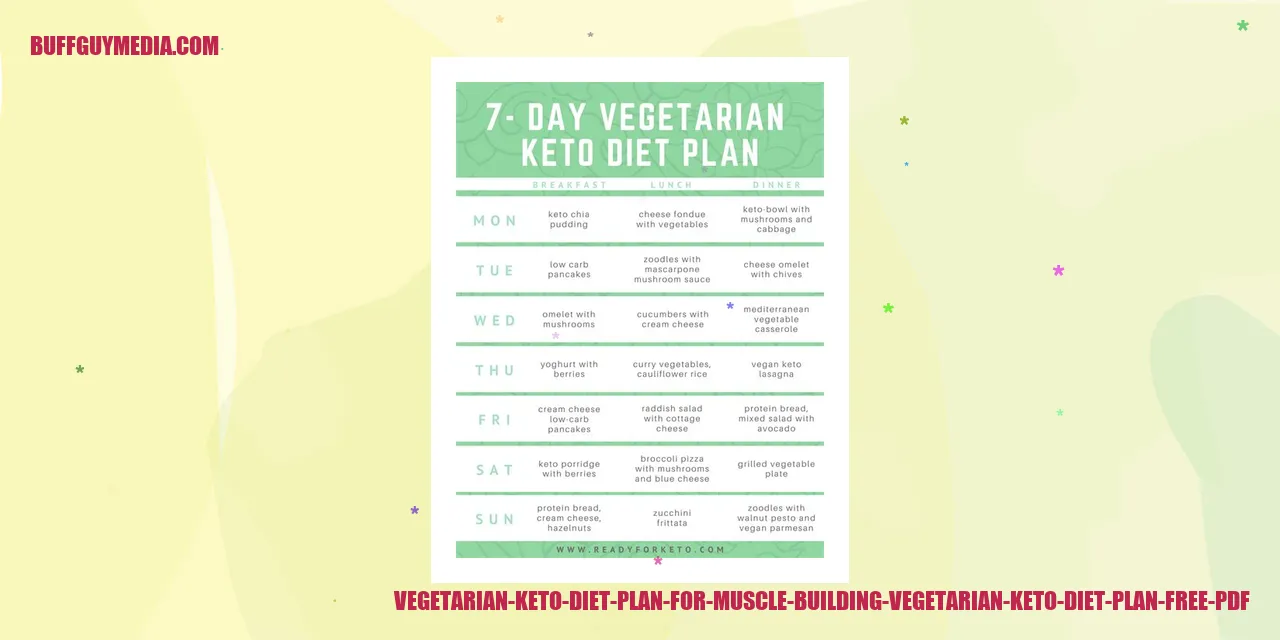
A Comprehensive Guide to Building Muscle with a Vegetarian Keto Diet
Optimizing Protein and Fat Intake
When following a vegetarian keto diet plan for muscle building, it’s vital to strike the right balance between protein and fat intake. Adequate protein consumption is necessary for muscle growth and repair, while a proper fat intake is essential to maintain ketosis. Incorporating plant-based protein sources and healthy fats into your diet will help achieve this balance.
The Best Plant-Based Protein Sources
Adopting a vegetarian diet doesn’t mean compromising on protein. There are numerous excellent sources of plant-based protein to support muscle growth. Tofu, tempeh, seitan, lentils, chickpeas, hemp seeds, chia seeds, and spirulina are among the top plant-based protein sources. Including these foods in your vegetarian keto diet plan ensures you get the necessary amino acids for muscle development.
Supplements to Enhance Muscle Growth
In some instances, fulfilling all nutritional requirements solely through diet may be challenging. In such cases, supplements can assist in supporting muscle growth. Plant-based protein powders like pea protein or brown rice protein can be added to shakes or smoothies. Additionally, supplements such as creatine, BCAAs (branched-chain amino acids), and omega-3 fatty acids can aid in muscle recovery and enhancement.
Effective Strategies for Workouts
While diet is crucial for muscle building, incorporating effective workout strategies is equally important. Weightlifting, resistance training, and high-intensity interval training (HIIT) are all effective exercises for building muscle. By combining the appropriate exercise routine with a vegetarian keto diet plan, individuals can maximize their muscle-building efforts.
By adhering to a well-rounded vegetarian keto diet plan, you can achieve optimal muscle growth while enjoying the benefits of a plant-based lifestyle. Remember to consult with a healthcare professional or a registered dietitian before making significant changes to your diet or exercise routine to ensure all your nutritional needs are met.
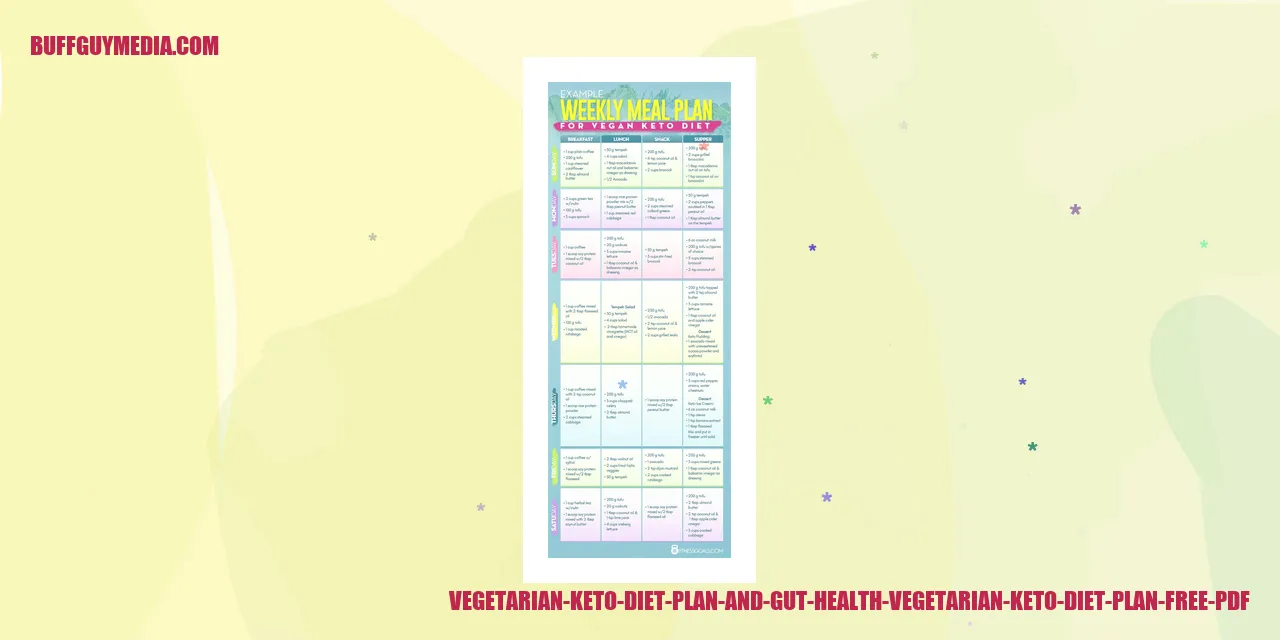
The Impact of a Vegetarian Keto Diet on Gut Microbiome
How the Vegetarian Keto Diet Affects the Gut Microbiome
As the vegetarian keto diet gains popularity, understanding its impact on the gut microbiome becomes essential. Research suggests that this diet can lead to changes in the composition of gut bacteria, resulting in a decrease in harmful strains and an increase in beneficial ones. This transformation promotes gut health and improves overall digestion.
The Importance of Fiber-Rich Foods for a Healthy Gut
Maintaining a healthy gut on a vegetarian keto diet requires incorporating fiber-rich foods. Leafy greens, avocados, chia seeds, and flaxseeds are excellent sources of fiber for vegetarians on a keto diet. These foods not only provide vital nutrients but also help regulate bowel movements and maintain a favorable gut environment.
Incorporating Probiotics and Prebiotics into a Vegetarian Keto Diet
Probiotics and prebiotics play a vital role in supporting a healthy gut microbiome. Probiotics, found in fermented foods like yogurt, sauerkraut, and kimchi, offer numerous health benefits when consumed. Prebiotics, on the other hand, act as food for beneficial bacteria and can be obtained from garlic, onions, and asparagus, among other sources.
Tips for Ensuring Optimal Gut Health
In addition to following a vegetarian keto diet, there are several tips for maintaining optimal gut health. Staying hydrated and drinking an adequate amount of water throughout the day is key to supporting proper digestion and preventing constipation. Managing stress levels is also crucial, as stress can negatively affect gut health. Engaging in activities such as yoga, meditation, or mindful breathing can help reduce stress. Avoiding processed foods, excessive alcohol consumption, and smoking can further contribute to a healthier gut.
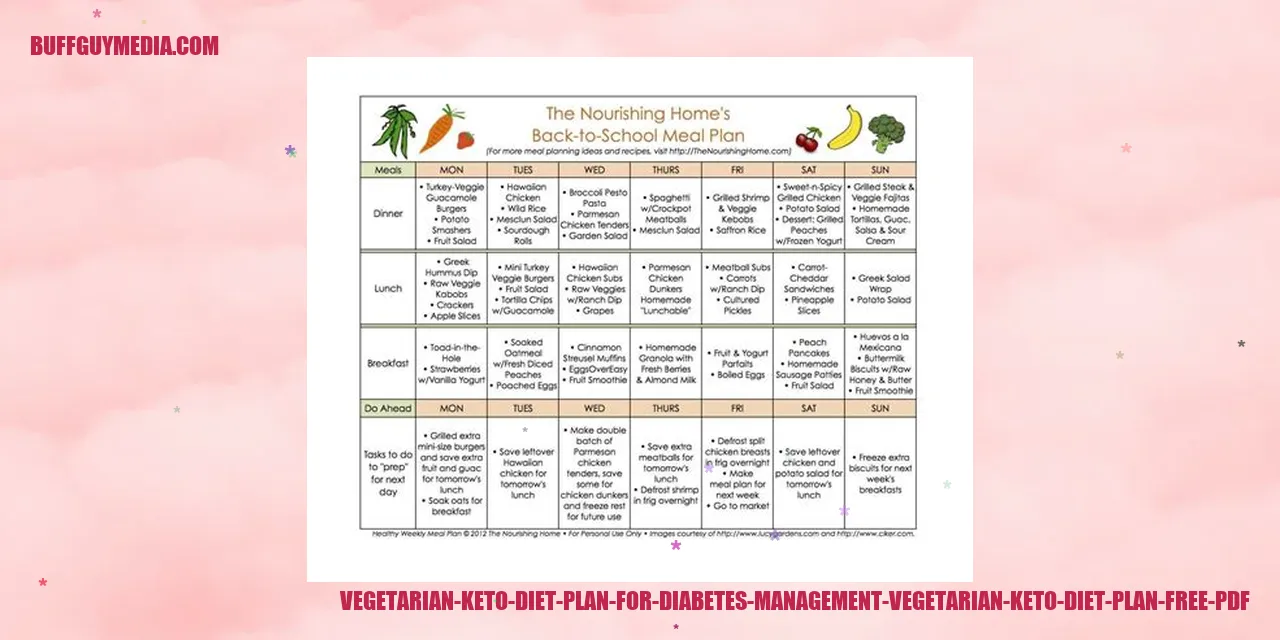
Effective Vegetarian Keto Diet for Controlling Diabetes
Advantages of Vegetarian Keto Diet for Diabetes
A combination of a vegetarian diet and a ketogenic diet can greatly contribute to managing diabetes. By following a vegetarian keto diet, which excludes meat and emphasizes a low-carbohydrate, high-fat intake, individuals with diabetes can improve their blood sugar control and overall well-being.
One significant benefit of a vegetarian keto diet for diabetes is its ability to reduce blood sugar levels and enhance insulin sensitivity. By minimizing carbohydrate intake, the diet helps regulate blood sugar spikes and maintain stable glucose levels. As a result, this can lead to better glycemic control and decrease the risk of diabetes-related complications.
In addition, a vegetarian keto diet can aid in weight management. Weight gain is a common risk factor for diabetes, and shedding extra pounds can significantly improve blood sugar control. The high-fat content of the diet promotes satiety, helping individuals feel fuller for longer and reducing the temptation to overeat. Moreover, studies have indicated that the state of ketosis induced by the diet may increase fat burning and expedite weight loss.
Choosing Low Glycemic Index Foods
When following a vegetarian keto diet for diabetes management, it is crucial to opt for foods with a low glycemic index (GI). The GI measures how quickly a food containing carbohydrates raises blood sugar levels. Low GI foods are digested and absorbed more slowly, resulting in a gradual increase in blood glucose levels, which is beneficial for diabetics.
Examples of suitable low GI vegetarian foods for a keto diet include non-starchy vegetables such as broccoli, cauliflower, spinach, and zucchini. Nuts, seeds, avocados, and oils like olive oil and coconut oil are also low in carbs and have a low GI.
Maintaining Blood Sugar Monitoring on a Vegetarian Keto Diet
While pursuing a vegetarian keto diet for diabetes, consistent blood sugar monitoring is vital. Regular monitoring enables individuals to understand how their bodies respond to different foods and make necessary adjustments to their diet. Blood glucose testing kits are widely available and easy to use.
By keeping track of blood sugar levels, individuals can identify which foods significantly impact their blood sugar and make any necessary modifications to their diet. Stable blood sugar levels are essential in reducing the risks associated with diabetes and ensuring optimal health.
Consulting with Healthcare Professionals
Before embarking on any diet plan, including a vegetarian keto diet for diabetes management, it is crucial to seek advice from healthcare professionals. Registered dietitians or nutritionists can provide personalized guidance tailored to an individual’s specific needs and medical history.
Healthcare professionals can assess any potential risks or contraindications and modify the diet plan to ensure its safety and effectiveness. They can also monitor an individual’s progress and make any necessary adjustments to optimize blood sugar control and overall health.
Remember, the vegetarian keto diet can be a powerful tool in managing diabetes, but it should always be done under the guidance of healthcare professionals. By selecting low glycemic index foods, monitoring blood sugar levels, and seeking professional advice, individuals can successfully incorporate this dietary approach into their diabetes management plan.]
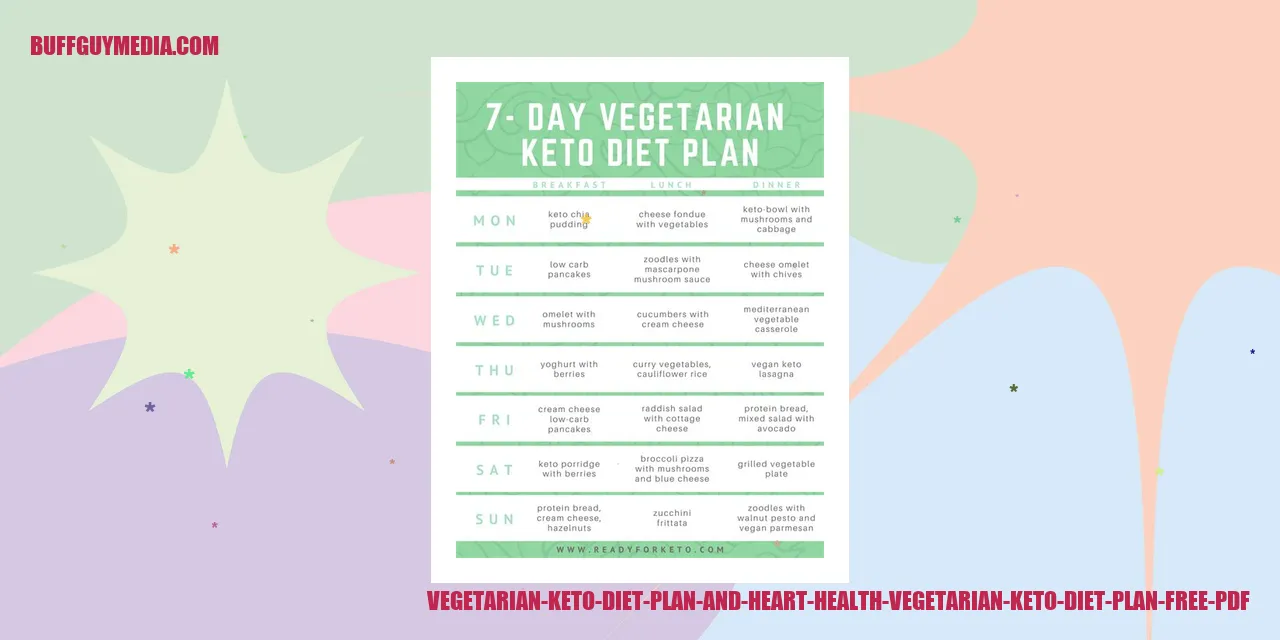
Improving Heart Health with a Vegetarian Keto Diet Plan
Lowering the Risk of Cardiovascular Diseases
Achieving optimal heart health and reducing the risk of cardiovascular diseases can be accomplished by adopting a Vegetarian Keto Diet Plan. This unique dietary approach combines the principles of a low-carb, high-fat regimen with a focus on plant-based nutrition.
One key aspect of the Vegetarian Keto Diet Plan is incorporating plant-based fats into meals. Including sources like avocados, nuts, seeds, and olive oil provides the body with essential monounsaturated and polyunsaturated fats. These healthy fats can effectively lower bad cholesterol levels, subsequently promoting a healthy heart.
Optimizing Heart Health through Dietary Choices
Effective management of cholesterol levels is crucial for maintaining optimal heart health. The Vegetarian Keto Diet Plan allows individuals to incorporate foods rich in plant sterols, legumes, oats, and soy-based products into their meals. These ingredients are abundant in soluble fiber, which aids in reducing LDL (bad) cholesterol levels and supports overall heart health.
In addition, the Vegetarian Keto Diet Plan encourages the consumption of vegetables, fruits, whole grains, and legumes, all of which are excellent sources of dietary fiber. Fiber plays a vital role in managing cholesterol absorption and blood pressure levels, both of which are essential for a strong heart.
Enhancing Heart Health through Physical Activity
While following a Vegetarian Keto Diet Plan offers numerous benefits for heart health, it is equally important to incorporate regular exercise into your routine. Engaging in moderate-intensity activities like walking, jogging, cycling, or swimming for a minimum of 150 minutes per week can strengthen the heart and improve blood circulation, ultimately promoting cardiovascular health.
By adopting a Vegetarian Keto Diet Plan and incorporating regular exercise, individuals can effectively reduce risk factors associated with cardiovascular diseases. It is crucial to consult healthcare professionals or registered dietitians before making significant changes to your diet or lifestyle, particularly if you have underlying medical conditions.

The Impact of a Vegetarian Keto Diet on Mental well-being
The Significance of a Vegetarian Keto Diet in Promoting Mental Health
The vegetarian keto diet has gained immense popularity due to its ability not just to aid in weight loss but also to positively influence mental well-being. Studies indicate that following a well-designed vegetarian keto diet plan can contribute towards improved mental health and overall psychological well-being.
Elevating Mood and Energy Levels
One of the major benefits of a vegetarian keto diet in terms of mental well-being is its capacity to enhance mood and boost energy levels. By eliminating processed carbohydrates and sugars, known to cause energy crashes and mood swings, the vegetarian keto diet centers around healthy fats, proteins, and vegetables. These vital nutrients provide a steady supply of energy, stabilize blood sugar levels, and assist in enhancing mood and overall cognitive function.
Omega-3 Fatty Acids for Cognitive Health
An additional significant aspect of the vegetarian keto diet when it comes to mental well-being is its emphasis on consuming omega-3 fatty acids. Omega-3 fatty acids are essential for brain health and have demonstrated their ability in reducing symptoms of depression and anxiety. Vegetarian sources of omega-3 include flaxseeds, chia seeds, and walnuts, which can be easily incorporated into a vegetarian keto diet plan to support mental wellness.
Practicing Stress Management Techniques
In addition to following a vegetarian keto diet, integrating stress management techniques can further enhance mental well-being. These techniques could involve engaging in mindfulness meditation, regular physical activity, ensuring sufficient sleep, and practicing relaxation exercises. By combining a wholesome diet with effective stress management strategies, individuals can experience improved mental health and overall well-being.
In conclusion, the vegetarian keto diet, with its emphasis on plant-based sources of healthy fats and essential nutrients, plays a crucial role in promoting mental well-being. By elevating mood and energy levels, providing necessary omega-3 fatty acids, and incorporating stress management techniques, individuals can uplift their mental health and enjoy a more balanced and fulfilling life.
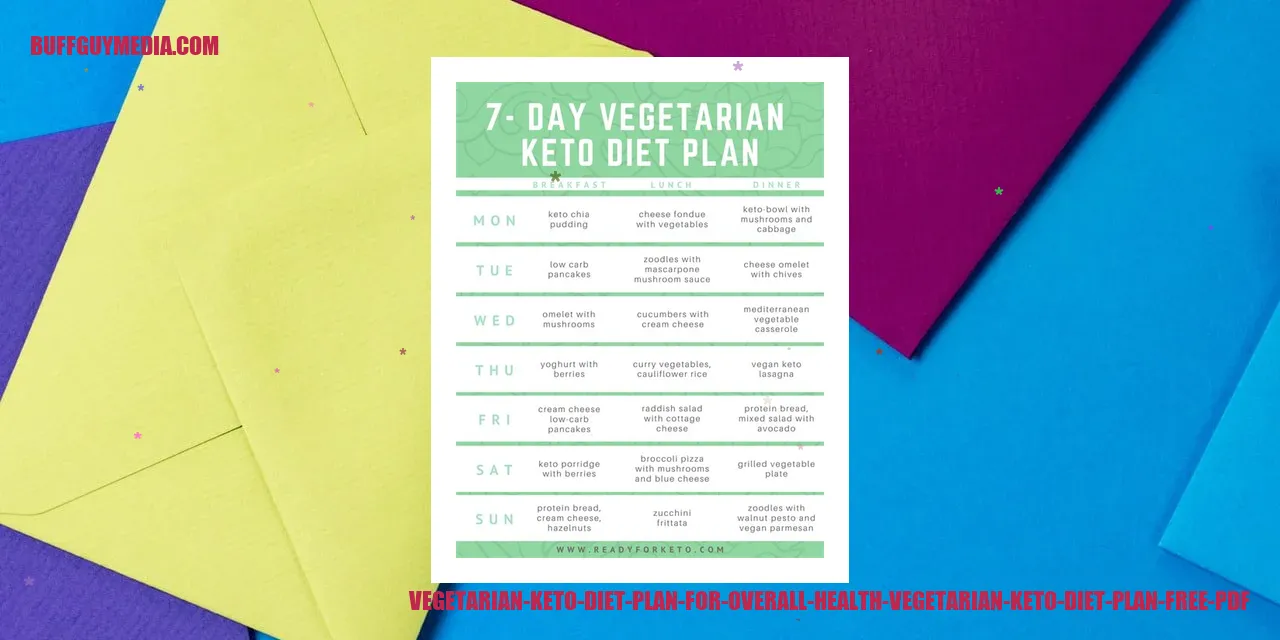
The Benefits of a Vegetarian Keto Diet for Your Overall Health
Increasing Nutrient Density in Your Meals
Discover the power of a vegetarian keto diet in enhancing the nutrient density of your meals. By prioritizing plant-based foods that are packed with essential nutrients, while reducing your carbohydrate intake, you can guarantee that your body receives a wide variety of vitamins, minerals, and antioxidants. Boost the nutritional value of your meals by including leafy greens, cruciferous vegetables, nuts, seeds, and nourishing fats like avocados and coconut oil.
The Significance of Proper Hydration
Ensuring proper hydration is vital when following a vegetarian keto diet. Adequate water intake not only supports overall health but also facilitates digestion, detoxification, and nutrient absorption. Maintain optimal hydration levels by drinking enough water throughout the day and incorporating hydrating foods such as cucumbers, watermelon, and celery into your meals.
Regular Exercise for Optimal Well-being
Make regular exercise an integral part of your lifestyle for optimal well-being while embracing a vegetarian keto diet. Engaging in activities that you enjoy, such as cardiovascular exercises, strength training, yoga, or sports, offers a multitude of benefits. Regular exercise improves cardiovascular health, builds muscle mass, aids in weight management, and enhances overall energy levels.
Addressing Common Concerns and Clearing Misconceptions
When embarking on a vegetarian keto diet, it is normal to have concerns or come across misconceptions. It is crucial to understand that with careful planning and food choices, a vegetarian keto diet can provide all the necessary nutrients your body requires. Consult with a healthcare professional or a registered dietitian to ensure you meet your dietary needs and address any questions or concerns you may have.
Frequently Asked Questions about Vegetarian Keto Diet 
How can I ensure sufficient protein intake on a vegetarian keto diet?
Meeting your protein requirements while following a vegetarian keto diet might be challenging, but it’s feasible with the right choices. Including protein-rich foods such as tempeh, tofu, seitan, dairy products, eggs, and plant-based protein powders can help you attain the necessary protein levels. Striking a balance between protein and fat intake is vital to maintain ketosis.
Is it safe to adopt a vegetarian keto diet during pregnancy or while breastfeeding?
Generally, it is not advisable to follow a vegetarian keto diet during pregnancy or lactation. Both these phases demand additional nutrients, and sticking to a low-carbohydrate regimen for ketosis might not provide sufficient energy for both the mother and the baby. It is crucial to seek personalized guidance from a healthcare professional for suitable dietary recommendations.
Can I build muscle on a vegetarian keto diet?
Absolutely! Building muscle on a vegetarian keto diet is possible. To achieve this, focus on consuming ample protein through sources such as plant-based protein powders, tofu, tempeh, and dairy products if you include them in your diet. Combining your protein intake with regular resistance training exercises is essential for muscle development.
What are some potential side effects of a vegetarian keto diet?
Some possible side effects of a vegetarian keto diet include nutrient deficiencies, constipation, halitosis (bad breath), and experiencing “keto flu” symptoms like fatigue and mental fog. To minimize these side effects, it is essential to maintain a well-balanced diet, stay adequately hydrated, and consider supplementation with essential nutrients.
When can I expect to see results on a vegetarian keto diet?
The timeline for observing results on a vegetarian keto diet can vary from person to person. While some individuals might experience weight loss and increased energy levels within the initial week, it can take a few weeks for the body to fully adapt to ketosis. The speed of results can be influenced by consistency with the diet and individual factors.
Can I include fruits in a vegetarian keto diet?
Although fruits contain natural sugars, they are generally high in carbohydrates and can hinder the achievement or maintenance of ketosis. However, certain low-carb fruits like berries can still be consumed in moderation while following a vegetarian keto diet. It is crucial to monitor your carbohydrate intake and select fruits accordingly.
Do I need to track macronutrients on a vegetarian keto diet?
Yes, tracking macronutrients is essential when following a vegetarian keto diet to ensure proper balance of protein, fat, and carbohydrates. This practice helps you stay in a state of ketosis while meeting your nutritional needs. Numerous apps and online tools are available to simplify the process of tracking macronutrients.


